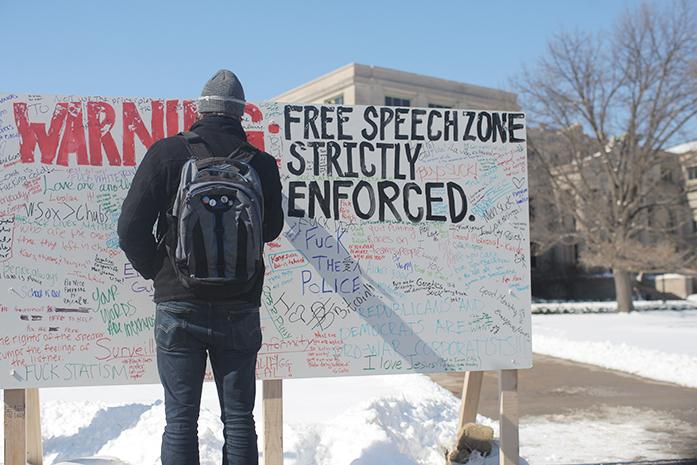By Madeleine Neal
For University of Iowa senior Betsy Pearson, free speech on college campuses is crucial.
Pearson is the UI chapter president of Young Americans for Liberty, a nationwide organization working on college campuses to encourage “winning on principle.”
The group will launch its “Fight for Free Speech” campaign at the UI today. A press release said the group will challenge speech codes that it finds unconstitutional.
“There is a dangerous trend on college campuses right now that speech should be censored if someone doesn’t agree or it hurts someone’s feelings,” Pearson wrote in the release. “Our [Young Americans] chapter believes the free flow of ideas is vital to a healthy academic environment, and we’re here to combat these authoritarian voices.”
According to the release, during the spring, nearly 300 Young American chapters at college campuses nationwide participated in the campaign.
The UI, in Pearson’s view, should be no different.
“The rules that [officials] have on this public university are unconstitutional,” she said. “College is a really good environment to express free speech.”
Pearson said the purpose of the event is to gain visibility for the Young American organization and for the issue of speech codes.
Pearson said “banning” free speech is becoming far too mainstream.
“We need to get back to the basics of the Constitution,” she said.
In the press release, Alexander Staudt, the Young Americans’ director of free speech, said the speech-code debate affects all students — regardless of political ideology.
“This issue affects all students — conservatives, liberals, libertarians, blacks, Latinos, Asians, whites, and everyone else in between,” he wrote in the release. “It puts a choke-hold on the exploration of ideas, which is the hallmark of intellectual growth for our nation’s future leaders — we must unite to protect speech for all.”
UI sophomore Alisha McTaggart said she understands the importance of the First Amendment and speech codes on college campuses.
“We are young, and we are expressing our love and compassion for democracy,” she said. “But I believe speech codes are beneficial to students.”
McTaggart said she thinks there needs to be an open, mutually understood relationship among students about their First Amendment rights. She said she believes that for the betterment and safety of students, speech codes are a great rule to combat hurtful language and threatening language.
“All are entitled to their own opinions, but for the atmosphere of college campuses, I truly believe that speech codes are really the way to go,” she said.
Speech codes are essentially safe zones intended to protect potentially targeted groups of people, according to the groups website.
UI sophomore Jordan Brendeland said colleges would not be able to help people grow and evolve without First Amendment rights.
“As we prepare for the working world and other aspects of adult life, we learn about self-expression,” she said. “You can’t go to a new place full of new people with new ideas and not have your perspectives change at all.”
The press release said the group disagrees with the designated “free-speech zone.”
Young Americans said organization members plan to “exercise their First Amendment rights” outside of the zone throughout the day. These “trigger events,” as Pearson called them, are nationwide events.



